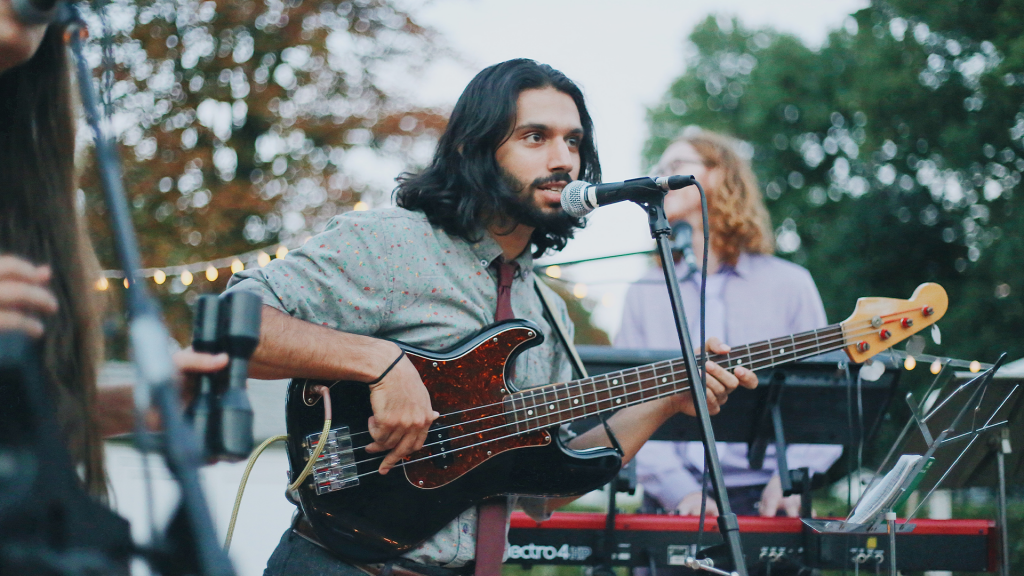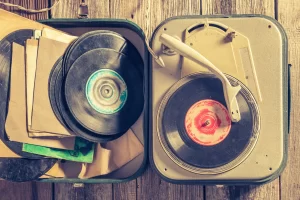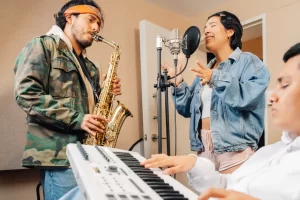In the world of music, a revolution is underway. This revolution, known as the democratization of music creation, is leveling the playing field and giving birth to a new wave of independent artists. But what exactly does this mean?
At its core, the democratization of music creation refers to the increasing accessibility of music production and distribution. It’s about breaking down the barriers that once existed in the music industry and allowing anyone with passion and creativity to produce, share, and monetize their music.
Gone are the days when creating music required expensive studio time and a record deal with a major label. Today, thanks to advances in technology, all you need is a good idea and the right software to bring it to life. From bedroom studios to globally distributed tracks, music creation has never been more accessible.
This shift is not just changing how music is made; it’s also changing who gets to make it. With the proliferation of affordable production tools and platforms, we are seeing an influx of independent artists – artists who are taking control of their own creative process and carving their own path in the music industry.
In this blog post, we’ll delve into this exciting trend, exploring how technology is changing the music landscape, highlighting the tools that are making it possible, and celebrating the artists who are leading the charge. So, whether you’re an aspiring musician, a seasoned industry professional, or just a music lover curious about the future of the industry, read on.
The Evolution of Music Production
To fully understand the democratization of music creation, it’s essential to first look at how music has traditionally been produced and distributed. In the past, creating and sharing music was a complex, costly process that was often out of reach for many aspiring artists.
It involved recording in professional studios with expensive equipment, getting signed by a record label, and having physical copies of your music (such as CDs or vinyl records) manufactured and distributed to music stores around the world. This model placed significant barriers to entry for new artists, often making it difficult for them to break into the industry and reach listeners.
However, the advent of digital technology has dramatically changed this model. Nowadays, high-quality music can be created on affordable software right from one’s own bedroom. These digital audio workstations (DAWs) offer a suite of tools that allow artists to record, mix, and master their music to a professional standard without the need for a traditional recording studio.
Furthermore, the internet has opened up new avenues for music distribution. Platforms like SoundCloud and Bandcamp now allow artists to upload their music and share it with listeners worldwide, bypassing the need for a record deal or physical distribution. Artists can get their music on Spotify and other major platforms when they use a reputable music distribution company like Novecore.
This shift towards more accessible music creation and distribution is what we refer to as the democratization of music creation. It has removed many of the barriers that once stood between artists and their potential listeners, enabling anyone with a passion for music and a creative vision to produce and share their art with the world.
How Advances in Technology Have Made Music Creation More Accessible
The digital age has brought about many advancements that have significantly eased the process of music creation. These technological advancements have not only made high-quality music production possible at a fraction of the previous cost but also made it accessible to anyone with a computer and internet connection.
Digital Audio Workstations (DAWs): DAWs are software platforms that enable the recording, editing, and production of audio files. They have transformed the music production process by providing a full suite of tools for creating music, right from one’s own computer. Some popular DAWs include Ableton Live, Pro Tools, FL Studio, and GarageBand. These programs offer a range of capabilities from recording and editing to mixing and mastering, allowing artists to create professional-quality music without the need for expensive studio equipment.
Online Learning Resources: The internet is teeming with resources for learning music production. Websites like YouTube, Coursera, and Udemy offer tutorials and courses on everything from music theory to specific DAW techniques. This wealth of knowledge allows aspiring musicians to self-educate and continuously improve their skills, further lowering the barrier to entry.
Virtual Instruments and Plugins: Virtual instruments simulate the sound of real instruments, allowing artists to incorporate a wide variety of sounds into their music without needing to physically own each instrument. Similarly, plugins can replicate effects that were historically achieved using expensive hardware, such as reverb, delay, and compression.
Cloud Collaboration: Cloud-based platforms have made it easier for musicians to collaborate remotely. Artists can work together on the same project from different locations, share files instantly, and even livestream their production process.
AI-Based Music Tools: Recent years have seen the rise of AI-based tools that can assist with various aspects of music creation, from composing melodies to mastering tracks. These tools can help artists streamline their workflow and enhance their creativity.
These advancements have democratized music creation, making it more accessible and affordable. They have empowered a new generation of independent artists, allowing them to take control of their creative process and reach audiences on a global scale.
Affordable Production Tools
The democratization of music creation has been largely fueled by the availability of affordable production tools. Among these, Digital Audio Workstations (DAWs) like GarageBand, FL Studio, and Ableton Live have played a pivotal role. Let’s delve into each of these popular platforms.
GarageBand: Developed by Apple, GarageBand is a fully equipped music creation studio right inside your Mac — with a complete sound library that includes instruments, presets for guitar and voice, and an incredible selection of session drummers and percussionists. It’s user-friendly interface makes it a great choice for beginners just starting out in music production. Despite being free, GarageBand offers a comprehensive set of tools for recording, editing, and mixing music.
FL Studio: Formerly known as Fruity Loops, FL Studio is a powerful music production tool that has been embraced by both amateur musicians and professional producers alike. It offers a range of features including MIDI sequencing, a piano roll for creating and editing patterns, and a mixer for mastering your tracks. Its unique pattern-based workflow allows for a highly flexible and intuitive approach to music production.
Ableton Live: Designed for use in both live performances and studio production, Ableton Live is a versatile DAW that has gained popularity for its advanced features and functionality. It offers a range of tools for composing, arranging, and mixing music, and its unique Session View allows for improvisation and experimenting with musical ideas in a non-linear fashion. Ableton Live is also known for its extensive library of sounds, instruments, and effects.
Each of these DAWs provides a unique set of tools and workflows, catering to different styles and approaches to music production. By lowering the financial barrier to entry, they have opened up the world of music creation to a broader audience, fostering a new generation of independent artists.
Online Platforms for Music Distribution
Alongside advances in music production, the democratization of music creation has also been fueled by the rise of online platforms that allow artists to distribute their music directly to listeners. These platforms have eliminated the need for traditional record deals and physical distribution, making it easier than ever for independent artists to reach a global audience.
SoundCloud: SoundCloud has become a popular platform for musicians to share and promote their music. It has fostered a vibrant community of independent artists and music lovers, providing a platform for discovering new music and connecting with fans.
Bandcamp: Bandcamp is another platform that empowers independent artists by allowing them to sell their music to their fans. Artists can set their own prices and offer physical merchandise alongside digital downloads. Bandcamp’s model supports artists by passing on a significant portion of the revenue directly to them.
Spotify: While Spotify is primarily a music streaming service, it also offers tools for artists to distribute their music and engage with fans. With Spotify for Artists, musicians can submit their tracks for playlist consideration, access listener data, and promote their music.
These online platforms have revolutionized the way music is distributed, making it possible for independent artists to reach listeners around the world. They have broken down the barriers that once stood between musicians and their audience, contributing significantly to the democratization of music creation.
Keep in mind that distributing your music on major platforms typically requires artists to partner up with a music distribution company. Here at Novecore, we can help you sell your music on all major platforms, click here to sign up for free.
To Sum it Up
In the digital age, the democratization of music creation has transformed the landscape of the music industry. Affordable production tools like GarageBand, FL Studio, and Ableton Live have made it possible for anyone to create high-quality music from their own homes. At the same time, online platforms have revolutionized music distribution, making it easier than ever for independent artists to reach a global audience and share their art with the world.
However, while these advancements have certainly lowered the barriers to entry, succeeding in the music industry still requires talent, dedication, and a smart approach to distribution. That’s where platforms like Novecore come into play.
Novecore allows you to distribute your music on all major platforms, ensuring your tracks reach as many listeners as possible. It’s an excellent resource for independent artists looking to navigate the new music landscape and connect with fans around the world.
The future of music is here, and it’s more democratic and accessible than ever before. So why wait? Start your musical journey today by signing up for free at Novecore. Embrace the opportunities offered by the democratization of music creation and take control of your own artistic destiny.




